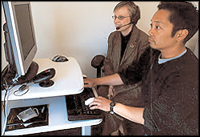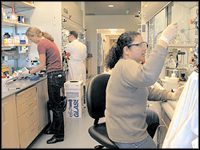information &
referral
case study
|
case study |
| University of California at San
Francisco Comprehensive Approach to Sustained Health and Productivity
Building on a Legacy of Reasonable Accommodations Thirty years ago, the University of California (UC) system responded creatively to the affirmative action requirements of the Rehabilitation Act for reasonable accommodation of disability. Mr. Larry Hickey, Assistant Director of Human Resources, explained that the UC system developed an Employee Rehabilitation Program to uphold these federal regulations and because they recognized that preventing unnecessary disability retirements was the fiscally responsible thing to do. Over the years, managers at the UCSF campus have expanded the program into a comprehensive approach to sustain the health and productivity of their employees and retain them in employment when they incur injuries or develop health-related conditions. "Our approach is based on our desire to retain the highly skilled employees who work here," Hickey explains. "We acknowledged the reality that sooner or later, all of our employees will experience some type of health problem, and we have attempted to incorporate this reality as part of the regular way we do things as an organization and as an employer." Hickey quotes Nick Plezbert, one of the UCSF Disability Management Analysts who says, “The health of our workforce is an immensely valuable asset - one that we must foster, not just preserve.” The UCSF Approach In order to achieve their goal of supporting the health and productivity of employees and their retention in employment, a comprehensive approach was required. The specific functions needed for this approach are organized into 3 tiers:
HR is not able to independently address all the aspects of the employment relationship that are required to achieve these goals. So, their approach relies on a coordinated system of working partnerships to carry out these functions. This partnership approach relies on support from management and departmental administrators and supervisors and is sustained by a commitment to ongoing dialogue. The program functions are supported by clearly written polices and guidelines, which were developed in partnership with the departments involved in their implementation. These policies and guidelines can be easily accessed by all parties on the HR website, http://ucsfhr.ucsf.edu. The program functions are also supported by staff services from HR. In addition, three rehabilitation professionals staff a Disability Management Services Unit. These professional Disability Management (DM) Analysts are assigned as partners to serve individual business units on-site. They serve as a single point of contact for employees and as a knowledgeable resource to assist the business unit in addressing and resolving disability related employment needs. "By serving as a consultant to a specific business unit, these DM Analysts are dedicated to the department and their people", says Hickey. "They know the business of that department and they really help the supervisor and the employee work out accommodation solutions that work. We attempt to provide the employee with good information from a neutral professional source, so that employees are well informed and can make good decisions along the way." A Comprehensive Process for Reasonable Accommodations Transitional Work allows employees with
temporary restrictions to work in a modified, alternative or
reduced-hours capacity while recuperating using a clear plan for a
defined period of time that has been developed with the supervisor and
employee. "We want to make dealing with transitional work just a regular
part of what supervisors do day-to-day, just as they deal with vacation
and sick leave", says Hickey. "All employees experience these needs from
time to time. Return-to-work programs aren’t effective when they take
this responsibility away from the supervisory process and assign it to
one designated staff person. So our goal is to make accommodation of
these temporary restrictions an integrated part of the way we all do
things here", explains Hickey. Conclusion For the past three decades, the UC system
has developed and sustained positive attitudes toward accommodation of
disability in its organizational culture and among its managers and
supervisors. The UCSF approach has built upon this heritage and evolved
from an employee rehabilitation program to a comprehensive absence
management program of prevention, disability management and productive
job retention that utilizes the principles of reasonable accommodation
as an everyday part of their operations.
|
 The
University of California at San Francisco (UCSF) is ranked among the
world's leading centers in providing health care, graduate and
professional study in the health sciences, and pioneering medical
research. Research discoveries of UCSF scientists have led to the
creation of many biotechnology companies and partnerships with industry
for collaborative studies and clinical trials. The campus includes the
Medical School and Medical Center, Pharmacy School, Dentistry School,
and Nursing School, and more than 20,000 graduate students, postdoctoral
fellows, faculty and staff.
The
University of California at San Francisco (UCSF) is ranked among the
world's leading centers in providing health care, graduate and
professional study in the health sciences, and pioneering medical
research. Research discoveries of UCSF scientists have led to the
creation of many biotechnology companies and partnerships with industry
for collaborative studies and clinical trials. The campus includes the
Medical School and Medical Center, Pharmacy School, Dentistry School,
and Nursing School, and more than 20,000 graduate students, postdoctoral
fellows, faculty and staff.